关于“生病”的25种英语表达
感冒的25种表达方法
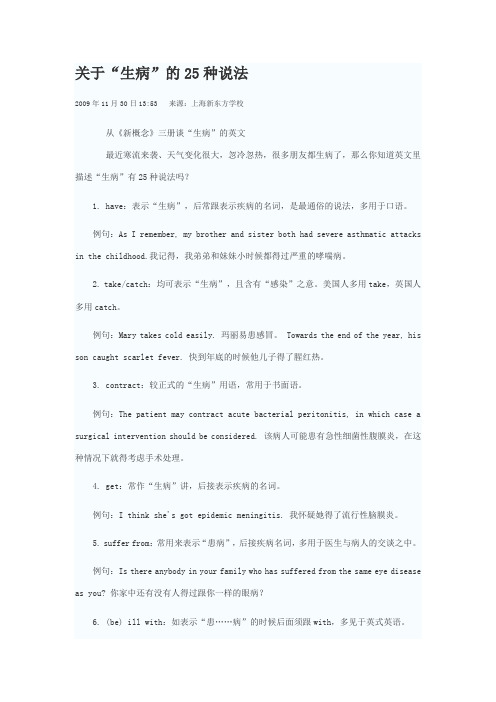
关于“生病”的25种说法2009年11月30日13:53 来源:上海新东方学校从《新概念》三册谈“生病”的英文最近寒流来袭、天气变化很大,忽冷忽热,很多朋友都生病了,那么你知道英文里描述“生病”有25种说法吗?1. have:表示“生病”,后常跟表示疾病的名词,是最通俗的说法,多用于口语。
例句:As I remember, my brother and sister both had severe asthmatic attacks in the childhood.我记得,我弟弟和妹妹小时候都得过严重的哮喘病。
2. take/catch:均可表示“生病”,且含有“感染”之意。
美国人多用take,英国人多用catch。
例句:Mary takes cold easily. 玛丽易患感冒。
Towards the end of the year, his son caught scarlet fever. 快到年底的时候他儿子得了腥红热。
3. contract:较正式的“生病”用语,常用于书面语。
例句:The patient may contract acute bacterial peritonitis, in which case a surgical intervention should be considered. 该病人可能患有急性细菌性腹膜炎,在这种情况下就得考虑手术处理。
4. get:常作“生病”讲,后接表示疾病的名词。
例句:I think she's got epidemic meningitis. 我怀疑她得了流行性脑膜炎。
5. suffer from:常用来表示“患病”,后接疾病名词,多用于医生与病人的交谈之中。
例句:Is there anybody in your family who has suffered from the same eye disease as you? 你家中还有没有人得过跟你一样的眼病?6. (be) ill with:如表示“患……病”的时候后面须跟with,多见于英式英语。
(完整版)关于“生病”的25种英语表达
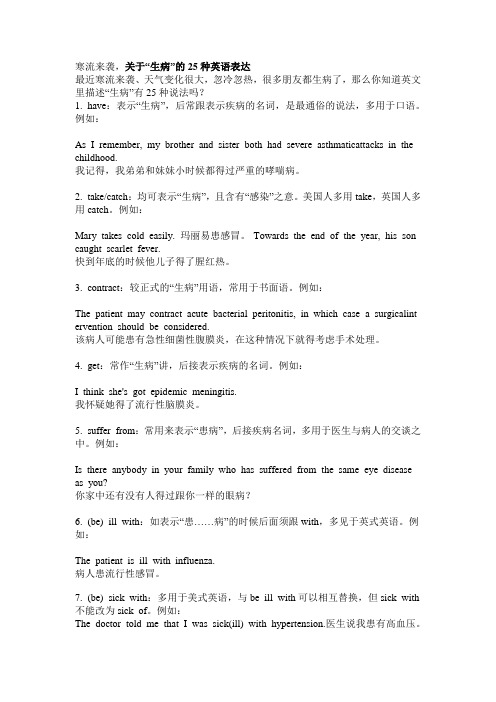
寒流来袭,关于“生病”的25种英语表达最近寒流来袭、天气变化很大,忽冷忽热,很多朋友都生病了,那么你知道英文里描述“生病”有25种说法吗?1. have:表示“生病”,后常跟表示疾病的名词,是最通俗的说法,多用于口语。
例如:As I remember, my brother and sister both had severe asthmaticattacks in the childhood.我记得,我弟弟和妹妹小时候都得过严重的哮喘病。
2. take/catch:均可表示“生病”,且含有“感染”之意。
美国人多用take,英国人多用catch。
例如:Mary takes cold easily. 玛丽易患感冒。
Towards the end of the year, his son caught scarlet fever.快到年底的时候他儿子得了腥红热。
3. contract:较正式的“生病”用语,常用于书面语。
例如:The patient may contract acute bacterial peritonitis, in which case a surgicalint ervention should be considered.该病人可能患有急性细菌性腹膜炎,在这种情况下就得考虑手术处理。
4. get:常作“生病”讲,后接表示疾病的名词。
例如:I think she's got epidemic meningitis.我怀疑她得了流行性脑膜炎。
5. suffer from:常用来表示“患病”,后接疾病名词,多用于医生与病人的交谈之中。
例如:Is there anybody in your family who has suffered from the same eye disease as you?你家中还有没有人得过跟你一样的眼病?6. (be) ill with:如表示“患……病”的时候后面须跟with,多见于英式英语。
“生病了”的25种说法46552
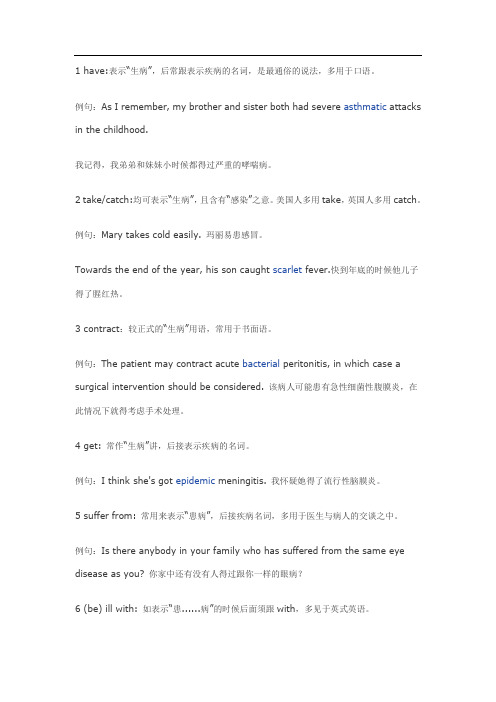
1 have:表示“生病”,后常跟表示疾病的名词,是最通俗的说法,多用于口语。
例句:As I remember, my brother and sister both had severe asthmatic attacks in the childhood.我记得,我弟弟和妹妹小时候都得过严重的哮喘病。
2 take/catch:均可表示“生病”,且含有“感染”之意。
美国人多用take,英国人多用catch。
例句:Mary takes cold easily. 玛丽易患感冒。
Towards the end of the year, his son caught scarlet fever.快到年底的时候他儿子得了腥红热。
3 contract:较正式的“生病”用语,常用于书面语。
例句:The patient may contract acute bacterial peritonitis, in which case a surgical intervention should be considered. 该病人可能患有急性细菌性腹膜炎,在此情况下就得考虑手术处理。
4 get: 常作“生病”讲,后接表示疾病的名词。
例句:I think she's got epidemic meningitis. 我怀疑她得了流行性脑膜炎。
5 suffer from: 常用来表示“患病”,后接疾病名词,多用于医生与病人的交谈之中。
例句:Is there anybody in your family who has suffered from the same eye disease as you? 你家中还有没有人得过跟你一样的眼病?6 (be) ill with: 如表示“患......病”的时候后面须跟with,多见于英式英语。
例句:The patient is ill with influenza. 病人患流行性感冒。
“生病了”的25种说法
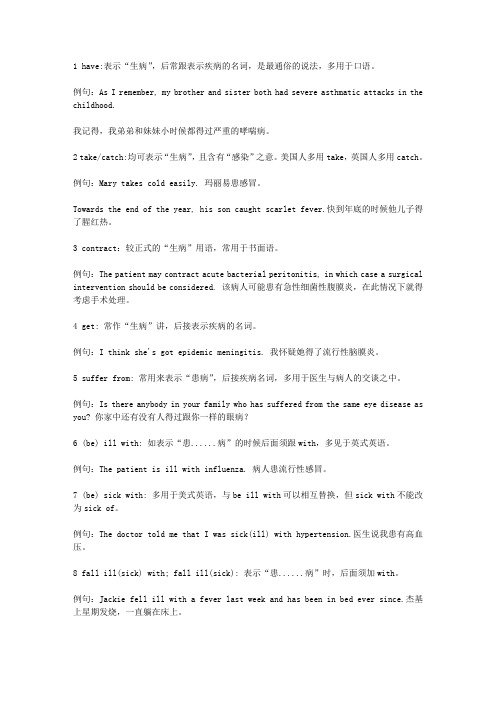
1 have:表示“生病”,后常跟表示疾病的名词,是最通俗的说法,多用于口语。
例句:As I remember, my brother and sister both had severe asthmatic attacks in the childhood.我记得,我弟弟和妹妹小时候都得过严重的哮喘病。
2 take/catch:均可表示“生病”,且含有“感染”之意。
美国人多用take,英国人多用catch。
例句:Mary takes cold easily. 玛丽易患感冒。
Towards the end of the year, his son caught scarlet fever.快到年底的时候他儿子得了腥红热。
3 contract:较正式的“生病”用语,常用于书面语。
例句:The patient may contract acute bacterial peritonitis, in which case a surgical intervention should be considered. 该病人可能患有急性细菌性腹膜炎,在此情况下就得考虑手术处理。
4 get: 常作“生病”讲,后接表示疾病的名词。
例句:I think she's got epidemic meningitis. 我怀疑她得了流行性脑膜炎。
5 suffer from: 常用来表示“患病”,后接疾病名词,多用于医生与病人的交谈之中。
例句:Is there anybody in your family who has suffered from the same eye disease as you? 你家中还有没有人得过跟你一样的眼病?6 (be) ill with: 如表示“患......病”的时候后面须跟with,多见于英式英语。
例句:The patient is ill with influenza. 病人患流行性感冒。
生病时的25种表达
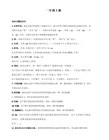
Daniel was laid up for nearly a month with chronic appendicitis. 丹尼尔患慢性阑尾炎卧床近一个月。
22 be pulled down by: 意为“患......病而病倒”。
例句:Mozart was pulled down by anaphylactoid shock suddenly at 3 yesterday afternoon.莫扎特昨天下午三点多患过敏性休克而病倒。
When having cold, children are exposed to pneumonia. 孩子感冒时易患肺炎。
14 suspect...of: 一般表示“怀疑......患......病”。
例句:On examination the patient was suspected of carcinomaof the caetum.经检查,怀疑病人患盲肠癌。
例句:The doctor told me that I was sick(ill) with hypertension.医生说我患有高血压。
8 fall ill(sick) with; fall ill(sick): 表示“患......病”时,后面须加with。
例句:Jackie fell ill with a fever last week and has been in bed ever since.杰基上星期发烧,一直躺在床上。
B: The Hilton Hotel in Paris. 巴黎的希尔顿酒店。
A: What will you dB: For Business. 商务旅行。
A: Ok, you’re through now. 好了,您可以通过了。
生病了的种英文说法
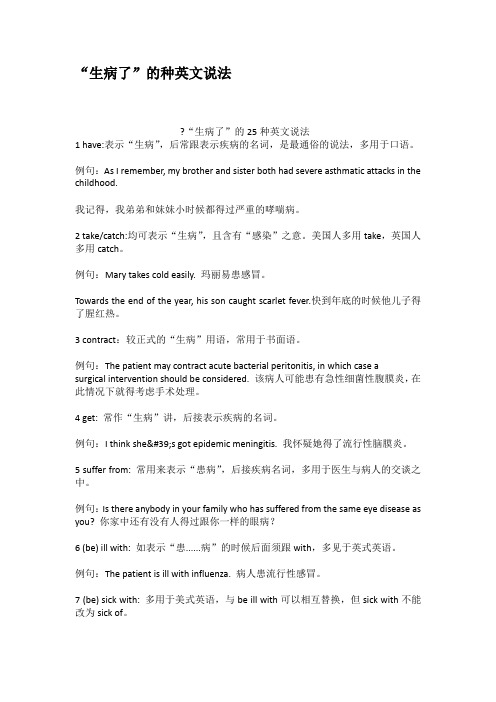
“生病了”的种英文说法?“生病了”的25种英文说法1 have:表示“生病”,后常跟表示疾病的名词,是最通俗的说法,多用于口语。
例句:As I remember, my brother and sister both had severe asthmatic attacks in the childhood.我记得,我弟弟和妹妹小时候都得过严重的哮喘病。
2 take/catch:均可表示“生病”,且含有“感染”之意。
美国人多用take,英国人多用catch。
例句:Mary takes cold easily. 玛丽易患感冒。
Towards the end of the year, his son caught scarlet fever.快到年底的时候他儿子得了腥红热。
3 contract:较正式的“生病”用语,常用于书面语。
例句:The patient may contract acute bacterial peritonitis, in which case a surgical intervention should be considered. 该病人可能患有急性细菌性腹膜炎,在此情况下就得考虑手术处理。
4 get: 常作“生病”讲,后接表示疾病的名词。
例句:I think she's got epidemic meningitis. 我怀疑她得了流行性脑膜炎。
5 suffer from: 常用来表示“患病”,后接疾病名词,多用于医生与病人的交谈之中。
例句:Is there anybody in your family who has suffered from the same eye disease as you? 你家中还有没有人得过跟你一样的眼病?6 (be) ill with: 如表示“患......病”的时候后面须跟with,多见于英式英语。
例句:The patient is ill with influenza. 病人患流行性感冒。
生病的英文

生病的英文在日常生活中,我们无法避免会生病。
当我们感到不舒服时,可能需要向医生或他人表达我们的症状和感受。
因此,学习关于生病的英文词汇和表达是非常有用的。
本文将为您介绍一些与生病相关的常用英文词汇和表达。
1. 生病的词汇以下是一些常用的与生病相关的词汇:•Illness:疾病•Disease:疾病•Sick:生病的•Fever:发烧•Cough:咳嗽•Sore throat:喉咙痛•Headache:头痛•Stomachache:胃痛•Nausea:恶心•Vomiting:呕吐•Diarrhea:腹泻•Fatigue:疲劳•Dizzy:头晕2. 询问及描述症状当您不舒服时,下面是一些用于询问和描述症状的常用表达:•What’s wrong?:出了什么问题?•How do you feel?:你感觉怎么样?•I feel sick.:我感到不舒服。
•I have a headache.:我头疼。
•My throat hurts.:我的喉咙疼。
•I have a fever.:我发烧了。
•I am coughing.:我在咳嗽。
3. 就医和看病当症状严重或持续时间较长时,我们可能需要就医。
下面是一些与就医和看病相关的英文表达:•I need to see a doctor.:我需要去看医生。
•Can you recommend a good doctor?:你能推荐一个好医生吗?•I made an appointment with the doctor.:我已经预约了医生。
•Where is the nearest hospital?:最近的医院在哪里?•I’m not feeling well.:我感觉不好。
•It hurts when I do this.:我这样做的时候会痛。
4. 医疗用语和用品在医院或看病过程中,我们可能会遇到一些医疗用语和用品的名称。
以下是一些常用的英文词汇:•Doctor:医生•Nurse:护士•Patient:病人•Hospital:医院•Clinic:诊所•Prescription:处方•Medication:药物•Injection:注射•X-ray:X光片•Blood test:血液检查•Bandage:绷带•Pill:药丸5. 健康建议当我们生病时,除了就医和药物治疗外,我们还可以采取一些健康建议来促进康复。
生病英文_精品文档
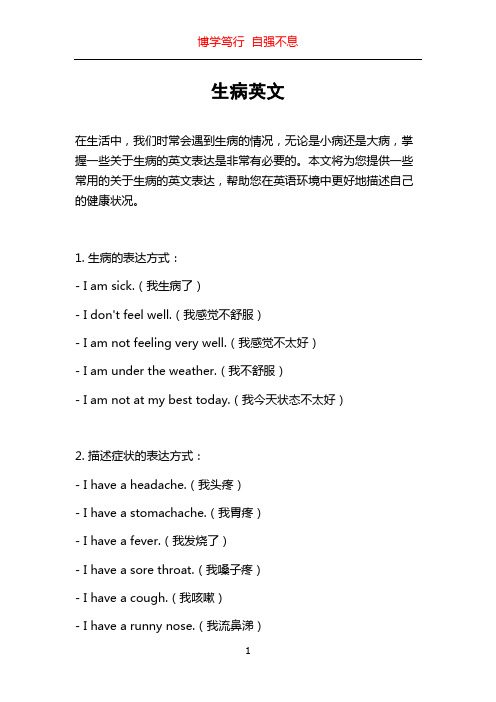
生病英文在生活中,我们时常会遇到生病的情况,无论是小病还是大病,掌握一些关于生病的英文表达是非常有必要的。
本文将为您提供一些常用的关于生病的英文表达,帮助您在英语环境中更好地描述自己的健康状况。
1. 生病的表达方式:- I am sick.(我生病了)- I don't feel well.(我感觉不舒服)- I am not feeling very well.(我感觉不太好)- I am under the weather.(我不舒服)- I am not at my best today.(我今天状态不太好)2. 描述症状的表达方式:- I have a headache.(我头疼)- I have a stomachache.(我胃疼)- I have a fever.(我发烧了)- I have a sore throat.(我嗓子疼)- I have a cough.(我咳嗽)- I have a runny nose.(我流鼻涕)- I have a rash.(我长了疹子)3. 看医生的表达方式:- I need to see a doctor.(我需要看医生)- I want to make an appointment with a doctor.(我想和医生预约)- I would like to schedule a visit to the doctor.(我想约个医生)- Can you recommend a good doctor?(你能推荐一个好医生吗?)- I think I need medical attention.(我觉得我需要医疗照顾)4. 医疗用具和药物的表达方式:- I need a prescription.(我需要处方药)- I need to buy some over-the-counter medicine.(我需要买些非处方药)- Can you recommend a pharmacy nearby?(你能推荐附近一家药店吗?)- I need a bandage for my cut.(我需要一块绷带来包扎我的伤口)- Do you have any painkillers?(你们有止痛药吗?)5. 表示希望好转的表达方式:- I hope I will get better soon.(我希望我会很快康复)- I hope I will recover quickly.(我希望我能快速恢复)- I hope this sickness won't last long.(我希望这次病不会持续太久)- I hope the treatment will be effective.(我希望治疗会有效果)- I look forward to feeling better soon.(我期待很快能感觉好一点)总之,掌握一些基本的生病英文表达对于在英语环境中描述自己的健康状况是非常重要的。
- 1、下载文档前请自行甄别文档内容的完整性,平台不提供额外的编辑、内容补充、找答案等附加服务。
- 2、"仅部分预览"的文档,不可在线预览部分如存在完整性等问题,可反馈申请退款(可完整预览的文档不适用该条件!)。
- 3、如文档侵犯您的权益,请联系客服反馈,我们会尽快为您处理(人工客服工作时间:9:00-18:30)。
寒流来袭,关于“生病”的25种英语表达
最近寒流来袭、天气变化很大,忽冷忽热,很多朋友都生病了,那么你知道英文里描述“生病”有25种说法吗?
1. have:表示“生病”,后常跟表示疾病的名词,是最通俗的说法,多用于口语。
例如:
As I remember, my brother and sister both had severe asthmaticattacks in the childhood.
我记得,我弟弟和妹妹小时候都得过严重的哮喘病。
2. take/catch:均可表示“生病”,且含有“感染”之意。
美国人多用take,英国人多用catch。
例如:
Mary takes cold easily. 玛丽易患感冒。
Towards the end of the year, his son caught scarlet fever.
快到年底的时候他儿子得了腥红热。
3. contract:较正式的“生病”用语,常用于书面语。
例如:
The patient may contract acute bacterial peritonitis, in which case a surgicalint ervention should be considered.
该病人可能患有急性细菌性腹膜炎,在这种情况下就得考虑手术处理。
4. get:常作“生病”讲,后接表示疾病的名词。
例如:
I think she's got epidemic meningitis.
我怀疑她得了流行性脑膜炎。
5. suffer from:常用来表示“患病”,后接疾病名词,多用于医生与病人的交谈之中。
例如:
Is there anybody in your family who has suffered from the same eye disease as you?
你家中还有没有人得过跟你一样的眼病?
6. (be) ill with:如表示“患……病”的时候后面须跟with,多见于英式英语。
例如:
The patient is ill with influenza.
病人患流行性感冒。
7. (be) sick with:多用于美式英语,与be ill with可以相互替换,但sick with 不能改为sick of。
例如:
The doctor told me that I was sick(ill) with hypertension.医生说我患有高血压。
8. fall ill(sick) with; fall ill(sick):表示“患……病”时,后面须加with。
例如: Jackie fell ill with a fever last week and has been in bed ever since.
杰基上星期发烧,一直躺在床上。
9. be seized with:一般表示“突然患……病”。
例如:
The patient was seized with apoplexy yesterday afternoon.
病人昨天下午忽患中风。
10. be attacked with:基本意是“为……疾病所侵袭”,常译成“患……病”。
例如:Attacked with acute myocardial infraction, the patient was warded for a week i n hospital.
病人患急性心肌梗塞后,在医院里监护了一个星期。
11. be troubled with:意为“患……病”。
例如:
The patient troubled with constipation should have enough sleep, regular time f or meal and proper mastication of food.
便秘病人应有足够的睡眠,进食定时,对于食物要细嚼慢咽。
12. be vulnerable to:一般常用来表示“易患……病”。
例如:
Fibres from the macular region of the retina are particularly vulnerable to infla mmation.
视网膜斑区的纤维特别易患炎症。
所以各位同学如果在表达感冒了的时候,现在就有多种选择了,而不要永远就用have a cold来表达。
学以致用,让你的英语丰富起来!
For personal use only in study and research; not for commercial use。
